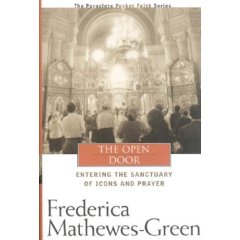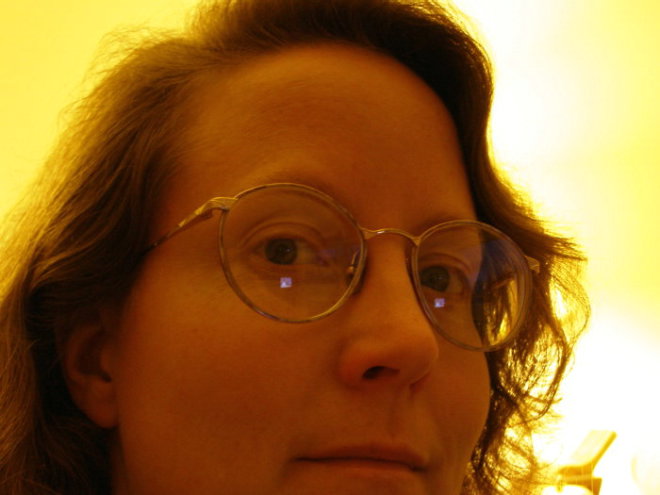Hi all:
This is Part Two of my thoughts on Eastern Orthodoxy as presented in Frederica Mathewes-Green's books. Part One is here.
Mathewes-Green's writing combines holiness and humor with such sincerity, eloquence, and passion that I find myself "almost persuaded." But as I'm reading along, I come across Orthodox teachings and practices that bring me to a Full Stop. In no particular order, here's what I cannot agree with or adhere to:
- Referring to Mary as Ever Virgin, Ever Pure, Champion Leader
- Elevating anyone to an official level designated as "saint"
- Praying to Mary or the "saints"
- Allowing only Orthodox members to receive the elements of the Lord's Supper
- Excluding catechumens from some parts of the service because it's God's secret to which only Orthodox members can be privy
- Including Anna and Joachim in the liturgy
- Not using instruments in worship
Here's a more in-depth response on some of these topics.
1. Regarding Mary, I agree with the term "Theotokos" or "God-bearer," because Mary did bear the Son of God as any woman carries a child. She delivered Him and raised Him. What an awesome honor and responsibility. And yes, the Bible declares that "all generations will call her blessed." Certainly. Absolutely. She is blessed for the humble way she opened herself to God's will and work.
But the Scriptures do not indicate in any way that she remained ever virgin, ever pure. Jesus's brothers and sisters are referred to in the gospels, and the simplest reading is that Joseph and Mary consummated their marriage and had more children. This is what Jewish families did. It would have been quite unnatural for them not to. The people of Nazareth referred to Jesus by saying "don't we know his mother and brothers and sisters?" No one in Scripture remarks on Mary and Joseph as not having other children. It would have been a big deal in that culture and not left unremarked.
In addition, Paul did not refer to the mother of Jesus in any special way, particularly regarding singleness and marriage, topics which were popular with him. In his discussions of his preference for singleness, he does not refer to "the example of the mother of our Lord" or any such argument, which, if it were already tradition that Mary remained ever virgin, I imagine he would have. Paul was a master logician and debater, who used all information that he possessed to make his case. If Mary's example would help him, I think he would have used it.
As far as purity, Mary is presented on more than one occasion as not fully understanding Jesus' mission, beginning with the wedding at Cana. She remained faithful to Him in as much as she knew and was at His cross, but she saw through a glass darkly, just as we do, and is not presented as having any privileged knowledge beyond the Annunciation. Even Joseph was given more knowledge than her when the Angel told him to go to Egypt because of Herod's persecution. We are not told that Mary received that word.
Mary is blessed among all women because she humbly carried a child though she "had known no man," gave birth, and raised Him. But not because she remained ever virgin, ever pure. And I don't believe we need any Champion Leader beyond Jesus Himself. To call anybody else that takes our focus from Him.
2. As for "saints," Jesus, Peter, Paul and others refer to all who believe in Jesus as the Son of God, our Saviour, as saints. Elevating some to official sainthood creates an hierarchy where there is none. "We are all one in Christ Jesus." Around the throne room in Revelation, the prayers of the saints are offered. That's us. All of us who believe and whose names are written in the Book of Life. No hierarchy is mentioned.
3. Likewise, there is one mediator between God and humans, the man Christ Jesus. Praying to anyone else is ineffectual at best, blasphemous at worst. Mathewes-Green compares asking Mary and the saints to pray for her to asking her friends to pray for her. But Mary and the saints don't necessarily know us. They aren't from our time period. Revelation's picture of heaven shows the people there continually praising God, not looking over their shoulders back to Earth to interecede for us still here.
Jesus and His Spirit are our intecessors. That's who we pray to. Per instruction from Jesus Himself.
Wow, this is getting long-winded! I didn't intend for that, but the fingers are flying ... Continue on at your own discretion - or level of patience!
4. When Jesus broke the bread and poured the wine at His last supper, he said "Remember me." Not, remember the Church, remember your brothers and sisters, remember the community of faith. No. Just "Remember me."
Excluding those who want to remember Jesus from the Lord's Supper because they have not joined the Orthodox church elevates the church to Jesus' level and lowers His unique work to the Church level.
It's true, Jesus left His Church on earth to continue His work. But He started the work when He left heaven, lived a perfect life on earth, and died for our sakes, declaring "it is finished." That is, His unique work is finished. Our work is to bring the message of His work to the world. But that doesn't elevate us to His level.
Also, someone can go through the motions to join the Orthodox Church just as they go through the motions to join any Christian tradition. We see through a glass darkly and can't tell another person's convictions. Only God can. There may be members in good standing of the Orthodox Church "who eat and drink condemnation to themselves" just as there may be in any Christian tradition. It's not up to us to decide. It assumes we have powers of spiritual discernment that we don't have.
5. Similarly, excluding nonmembers from certain parts of the service bothers me. God is Mystery to every believer. With the counsel of the Holy Spirit received at conversion, we understand more than those without the Holy Spirit, but we don't have secret knowledge beyond that. That sounds very Gnostic or Masonic to me. Christianity is not a secret club. Yes, we need the Holy Spirit to understand or at least grapple with the Mystery that is God, but anyone can receive that Holy Spirit if they will just believe that Jesus is who He said He was.
6. Anna and Joachim are legendary figures, believed by some Christian traditions and not by others. They are not in the Holy Scriptures so they should not be in the liturgy. Placing legendary characters alongside Jesus and Mary either raises the legends to historical status or lowers the historical characters to legend. Very uncomfortable. Full Stop.
7. Instruments in worship are very Biblical. Mathewes-Green refers to the elaborate richness of the Old Testament tabernacle and temple in defense of the elaborate Orthodox worship service. Yet the Old Testament also refers to many instruments being included in worship. One whole division of priests is devoted to the music of worship. David was a musician and gave instructions for the use of instruments in worship.
Having written this uber-long treatise, let me say I will continue to read Mathewes-Green's work because I enjoy her personal spiritual insights as well as some of the perspectives and teachings of the Orthodox Church. For example, I'm currently enjoying her introduction to icons:
 | The Open Door: Entering the Sanctuary of Icons and Prayer |
To conclude, I recommend Mathewes-Green's books for great writing and inspiration. These are my comments. I invite you to read her works and decide for yourselves.
Enjoy!
hrh







No comments:
Post a Comment